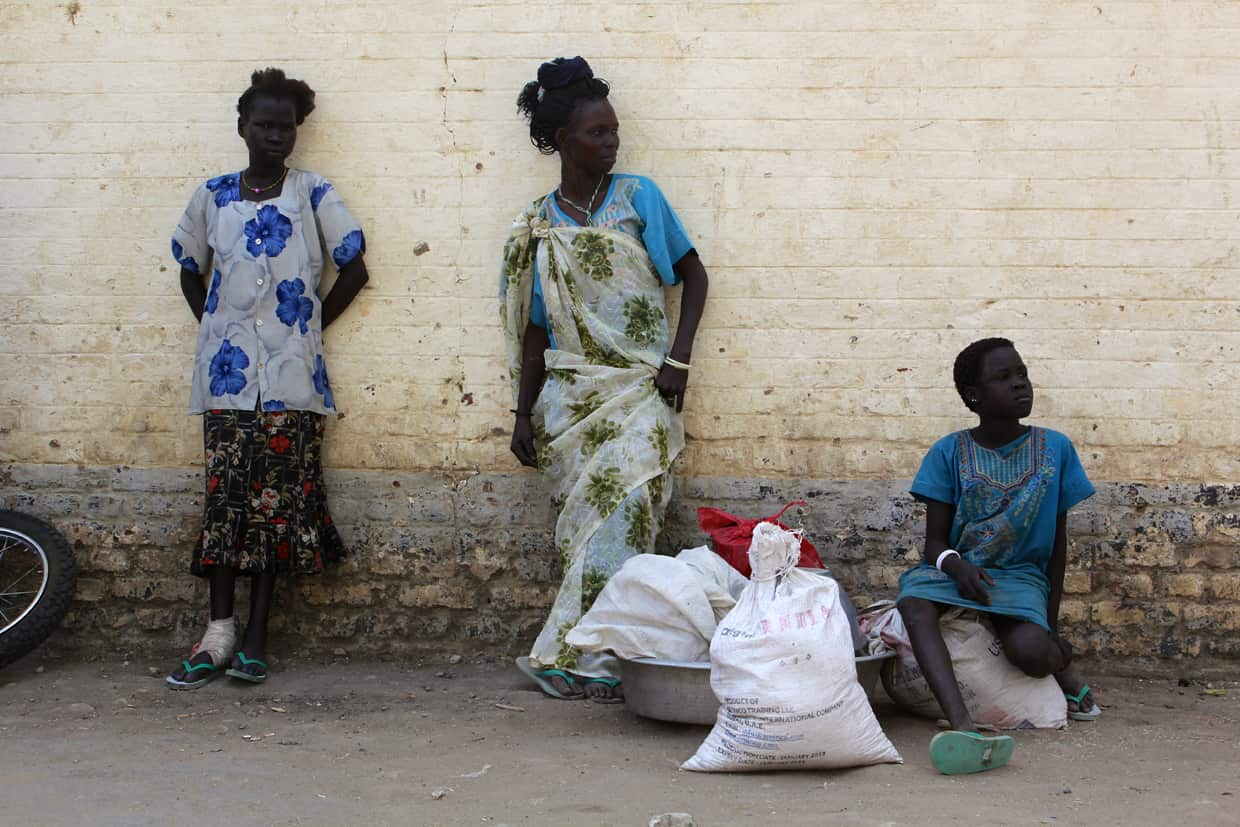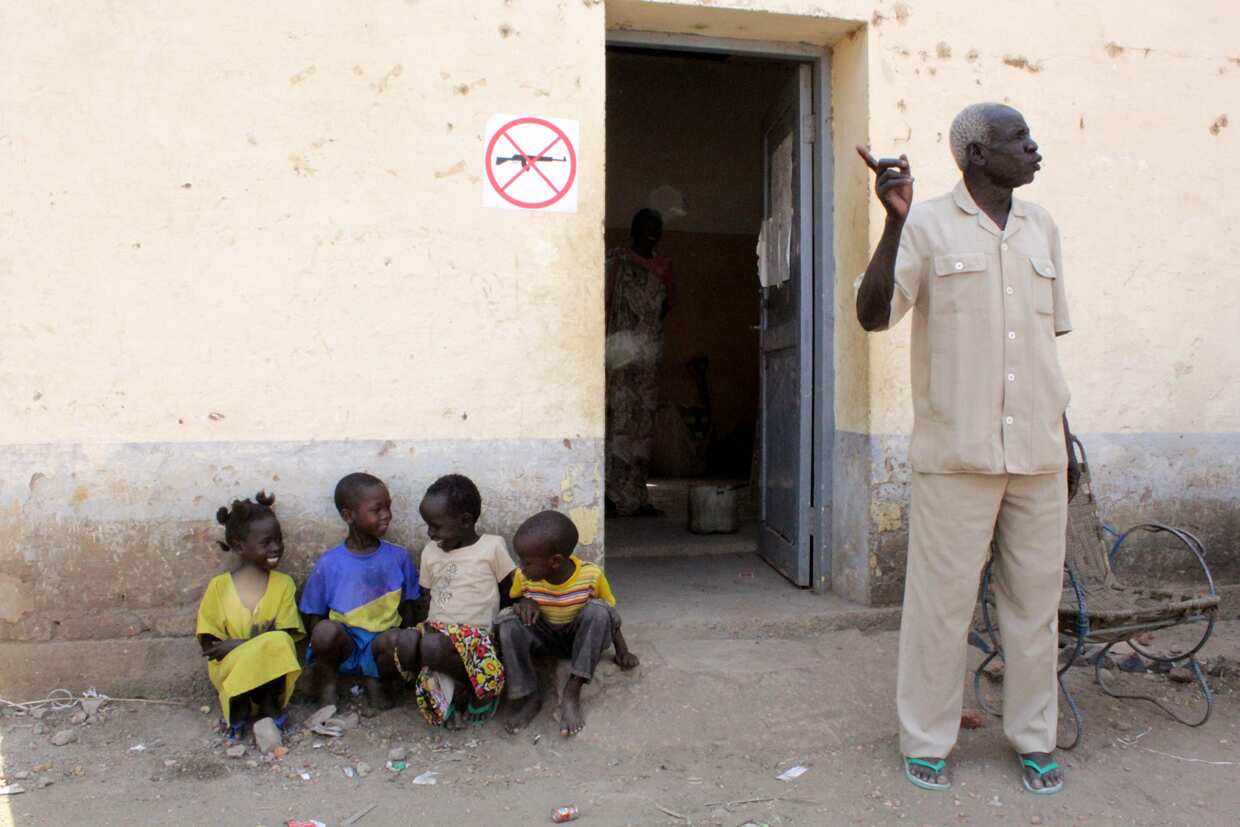Mary Adwok lies listlessly on the church floor surrounded by hundreds like her stranded in South Sudan’s six-week war.
St Joseph’s catholic church in Malakal, Upper Nile state, is usually a place of worship but has become a refuge for nine thousand as tensions and hostilities remain amid government control and a ceasefire agreement.
“I am here with my son,” she said. “My husband was shot when the fighting started in December, he died.”
“There is no food here, all the shops are broken, they’ve taken all the commodities.”
“We chose to come to church because God will protect us, the rebels they respect the church. Even the army with their long guns don’t shoot us here,” she said. Adwok, with a mattress and not much else, is squeezed into the church grounds. It is a similar situation at Malakal’s teaching hospital but the most oppressive scene is at the United Nations camp where 27,000 lives eek out a horrible existence.
Adwok, with a mattress and not much else, is squeezed into the church grounds. It is a similar situation at Malakal’s teaching hospital but the most oppressive scene is at the United Nations camp where 27,000 lives eek out a horrible existence.

It was the sight that one of the U.N’s top officials, Valerie Amos, described during her visit on Tuesday as “unbelievably dire.”
The Under Secretary-General for Humanitarian Affairs and Emergency Relief Coordinator, Amos, in South Sudan for three days, will urge President Salva Kiir to put down the guns and attack an unfolding humanitarian crisis.
“There is a potential health hazard in these informal camps that have now sprung up with way too many people, not enough water, not enough food," she said.
Toby Lanzer, the U.N’s humanitarian coordinator in South Sudan, said a potential cholera outbreak was also a grave concern.
“We haven’t seen it here but it is a race against time, considering heat, overcrowding, lack of latrines," he said.
The fighting in South Sudan, which became the world’s newest nation in July 2011, started in the capital Juba on December 15 but quickly spread across the country and has taken many thousands of lives while displacing more than 500,000.
According to U.N Human rights officials atrocities have been committed on both sides of this political struggle that took on an ethnic dimension between the country’s dominant tribes, Dinka and Nuer.
Jacob Kurtzer, spokesman for the International Committee of the Red Cross in South Sudan, said they were scaling up their efforts to respond to the country’s massive humanitarian need.
“You look at the scope of the civilian displacement, you look at the numbers of people wounded, and you can draw a conclusion that the respect for civilians (and) the protection of civilians had not been carried out by both parties,“ he said. Malakal, where fighting first broke out on December 26 and then January 14 when the government recaptured the town from rebels, on Friday suffered at the hands of looters who reportedly stole more than 3700 tonnes of food, enough to feed 220000 people for a month.
Malakal, where fighting first broke out on December 26 and then January 14 when the government recaptured the town from rebels, on Friday suffered at the hands of looters who reportedly stole more than 3700 tonnes of food, enough to feed 220000 people for a month.

The looting has created a “disaster,” according to Donovan Naidoo, South Sudan country director for the International Organisation for Migration that is working alongside the U.N’s aid effort.
“We are starting from scratch, all the essential needs we had are gone,” he said.
But the biggest worry for the U.N, Amos said, is that the community was still in fear despite a ceasefire agreement.
“We will have to guarantee people’s security and I think even that is not going to be enough to people. When we spoke to people they said they’d completely lost faith.
“They (are) saying to us that they want to be relocated to another country,” she said.
It was a sentiment echoed by Adwok.
“It’s terrible. They’ll kill anyone here. You see the fight was the Dinka tribe versus the Nuer tribe but now they’re killing anybody, somebody they see on the street or find in the house, they kill them. A woman, a man.
“Where can I go? This is my home. But I want to go to Juba. If I get a plane, I’ll just go,” she said.
Share

